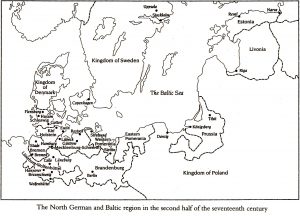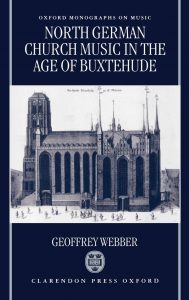North German 17th-Century Choral Music

Dieterich Buxtehude
Dieterich Buxtehude (c.1637-1707), born Diderik Hansen Buxtehude was a Danish or German organist and composer of the 17th century. His works are typical of the North German organ school. As a composer who worked in various vocal and instrumental idioms, Buxtehude’s style greatly influenced other composers, including Johann Sebastian Bach. Historically, Buxtehude is among the important composers of the mid-Baroque period in Germany. (Wikipedia)
The music of Dieterich Buxtehude was rediscovered in the mid-nineteenth century. Johannes Brahms and Bach biographer Philipp Spitta were a major part of the Buxtehude revival. It was Buxtehude’s organ music that was the major focus at that time, and much of the interest was sparked by needing an historical context for the music of J. S. Bach, whose complete works were at last being published one-hundred years after his death. Today Buxtehude is widely regarded as the most outstanding figure in the history of German church music between Heinrich Schütz (1585-1672) and Johann Sebastian Bach (1685-1750)
North German Church-Music Composers
The music of other North German composers who lived during Buxtehude’s time has mostly languished in obscurity and today their names are generally unknown. They composed both instrumental and choral music. Here, we concentrate on the chorale music. According to Geoffrey Webber, names such as Balthasar Erben, Georg Österreich, Kaspar Förster, and Georg Schürmann remain almost totally unknown, although much of their church music is of a quality to match that of Buxtehude.[1]
Church music flourished due to the tenets of Lutheranism. Martin Luther himself spoke many times of the value of music in church worship, stressing the importance of singing. The city in the North German region where the music flourished the most was Hamburg, because of the many grand churches and organs, an opera house that opened in 1678, and the Collegium Musicum created by organist and composer Matthias Weckmann (c.1616-1674).
[1] When I was in Leipzig in 2007, I was told by a man who was with a performance of Buxtehude’s Membra Jesu Nostra in Bach’s Thomaskirche in Leipzig that research into these composers’ music had just recently become a matter of interest and research in Germany. (Don Robertson)
These are composers of instrumental, vocal and choral music who deserve to be rediscovered:
- Dieterich Buxtehude (1637-1707)
- Nicolaus Bruhns (1665-1697)
- Matthias Weckmann (c.1616-1674)
- Franz Tunder (1614-1667)
- Johann Balthasar Erben (1626-1686)
- Georg Österreich (c.1664-1735)
- Kaspar Förster (c.1616-1673)
- Georg Schürmann (c.1672-1751)
- Christian Ritter (c.1650-after 1725?)
- Christoph Bernhard (1628-1692)
- Augustin Pfleger (1635-1686)
- Johann Theile (1646-1724)
- Johann Valentin Meder (c.1649-1719)
- Cratone Bütner (1616-1679)
- Nicolaus Strungk (c.1640-1700)
- Martin Köler (1620-1703)

